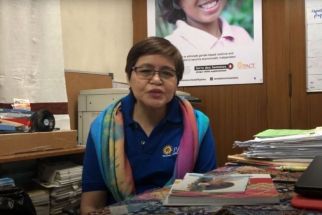Senate confirms 1st H1N1 case
MANILA, Philippines – Senate President Juan Ponce Enrile confirmed yesterday that a Senate employee tested positive for the Influenza A(H1N1) virus but allayed fears of a possible spread because the victim had already recovered.
He also advised fellow senators and about 1,500 employees to drink calamansi juice to boost their stamina to be able to resist the A(H1N1) virus.
“(They will) go through a procedure with temperature measurement, and they will be asked to wash their hands and to use alcohol if necessary. I advise everyone in the Senate to drink a lot of calamansi juice, just an advice, not a requirement,” Enrile said.
Upon the recommendation of Senate doctor Marianito Blancia, Enrile also directed the Senate sergeant-at-arms, assisted by the medical staff, to implement strict measures by requiring everybody to go through thermal scanners.
Enrile, 85, said the Senate has procured thermal scanners and thermometers.
Enrile declined to identify the infected employee, said to be a female, but he said the patient belongs to the Senate Economic Planning Office.
At a press conference, Enrile said there is no need to suspend Senate operations. He said the leadership has started precautionary measures to prevent the contagion from spreading in the chamber’s building in Pasay.
He said employees would be subjected to temperature monitoring.
“The employees will continue working. The investigations will continue. There are no disruptions,” Enrile said.
The House of Representatives had reported several cases of A(H1N1), one of whom died. But the fatality had other life-threatening illnesses. The House suspended work for several days after the first case was confirmed.
After he met up with Blancia for a brief medical update, Enrile said the affected Senate employee might have gotten the virus through community transmission.
“Probably from the community, not from here or any government office because it took some time before he was able to get a report on his/her infection. I think it took about several days and it was only known that indeed she had A(H1N1) but the person is already well when it was confirmed to be A(H1N1),” Enrile said.
Enrile also allayed fears of the Senate employees on the possible spread of the virus.
“This is a mild influenza. There is no reason to be alarmed. Just drink calamansi juice, Vitamin C,” Enrile said.
House reports 6th virus patient
Officials of the House of Representatives reported yesterday that a sixth employee has been infected with A(H1N1).
Dr. Richard Dizon of the House medical staff said the victim is a female employee, but refused to say where the employee is assigned in the House to avoid panic.
She has not been reporting for work since last week and was on self-quarantine at home, he said.
The House resumed operations last Monday after a five-day shutdown after a female committee staff member died of the virus and other complications last June 19. She was the first A(H1N1)-related death in the country.
Four other personnel have since been stricken, including a secretariat official and an officer of the Congressional Planning and Budget Department.
The official got sick a day after briefing reporters on the death of the female staff member. Days later, some of the reporters had fever.
“He should not have been the one who conducted the briefing,” said one reporter.
He said he noticed that the official was coughing during the briefing.
Since Monday, as a precautionary measure, the medical staff have been checking all persons entering the House premises for fever using thermal scanners.
Speaker Prospero Nograles said the premises have been thoroughly cleaned and disinfected.
Meanwhile, the Department of Education (DepEd) wants to equip public schools with thermal scanners to detect cases of A(H1N1).
Education Secretary Jesli Lapus said that the thermal scanners are expensive and the DepEd might just provide thermal scanners to big public schools with large student populations.
Lapus said that the lack of thermal scanners prevents public schools from conducting mandatory temperature scanning of students coming into schools to prevent those with flu from entering school premises.
“We also want to do that in public schools. But the thermal scanners are expensive,” Lapus said.
It was learned that one thermal scanner unit costs around P4,000.
“So we may have to limit the schools that will be provided with them to the large ones,” Lapus said.
The DepEd’s Influenza A(H1N1) Action Center said three of four schools that recently suspended classes due to confirmed cases of A(H1N1) were public schools.
Taal National High School in Taal, Batangas had four confirmed cases and Banilad Elementary School and Banilad High School, both in Batangas, which have 11 and 9 cases, respectively, have suspended classes starting July 2 until July 12.
Ateneo de Zamboanga in Zamboanga City also reportedly suspended classes from July 2 to 12 due to the discovery of one confirmed case.
Meanwhile, another wave of A(H1N1) could strike again after 14 months, a health expert said during a vaccines forum organized recently in Singapore by GlaxoSmithKline (GSK), a United Kingdom-based pharmaceutical company.
Derrick Sim, director of GSK’s Asia Pacific Flu Vaccine Franchise Group, said that based on the historical data on the different waves of previous influenza pandemic, another wave of global pandemic could hit again for a period of nine to 14 months.
“There could be more to come,” he said, adding that the current strain could mutate.
He noted that in January 1890, a flu pandemic hit London and another wave struck in March 1891.
In Copenhagen, a pandemic hit in June 1918 and this struck again in June 1919. Similarly, in England and Wales, a pandemic hit in January 1968 and another wave in January 1969.
The 2009 influenza was identified in April 2009 in Mexico.
Sim said that to prepare for the possibility of another wave, governments should continue to do surveillance work in animals and humans and to conduct non-medical interventions such as quarantine and social distancing.
Press Secretary Cerge Remonde said that the government should not be blamed for religiously reporting the confirmed cases of A(H1N1) because even though this has resulted in a 7th place ranking in the list of countries with virus cases, it also raised the awareness of the people about the pandemic.
Aside from transparency, the government has attributed its aggressive monitoring and contact tracing of cases in the country for the rise in the number of reported confirmed cases.
Remonde said that he suspects several countries do not report all of their confirmed cases.
“In other words, what the DOH is saying is that the reported high incidence of A(H1N1) cases here is because we are more transparent in our reporting,” Remonde said.
In his conversations with Health Secretary Francisco Duque III, Remonde said that he was informed that several countries have more cases than the Philippines but do not appear high on the WHO list because they do not report them all.
“In other words, we should not be penalized for, number one: being aggressive in monitoring the cases, being transparent in reporting cases, after all that policy made the public more aware of public health and the result of that is indicated by the fact that while a lot of people have died in the other countries, we have only one death,” Remonde said.
“If there is any good thing that has come out of this is that the Filipino people became more health conscious, they have become sanitation conscious,” he added. - With Jess Diaz, Rainier Allan Ronda, Iris Gonzales, Marvin Sy
- Latest
- Trending





























